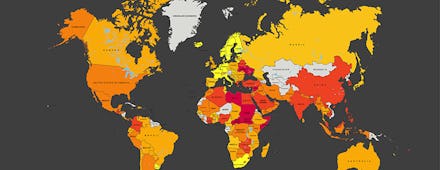These Are the Worst Places in the World to Be a Worker

The news: The ability to join a union and participate in collective bargaining is a universally recognized human right — but you wouldn't know it from looking at this map.
The International Trade Union Confederation (ITUC), a labor rights alliance, recently published the inaugural edition of its Global Rights Index, which examines the state of workers' rights in 139 countries. Based on 97 indicators — such as the ability to join unions, access due process and receive legal protection — ITUC also ranked the countries on a 1 (best) to 5 (worst) scale.
Image Credit: ITUC
The results are rather surprising: Among the countries with the best rating were Uruguay, Togo, Sweden, South Africa and Slovakia. Some countries received such poor assessments that they actually went off the scale: Central African Republic, Libya, Palestine, Somalia, South Sudan, Sudan, Syria and Ukraine had the dubious distinction of being awarded a 5+ rating.
As for the U.S., it received a lowly 4 for weak union rights and uneven collective bargaining.
"Countries such as Denmark and Uruguay led the way through their strong labour laws, but perhaps surprisingly, the likes of Greece, the United States and Hong Kong, lagged behind," ITUC general secretary Sharan Burrow wrote. "A country's level of development proved to be a poor indicator of whether it respected basic rights to bargain collectively, strike for decent conditions, or simply join a union at all."
Why this is important: As the map shows, the areas deemed to have the worst workers' rights are large, sprawling countries such as China and India, or regions in conflict, such as the Middle East and North Africa.
But compared to the rest of the North Atlantic region, the U.S. is not faring well. Other countries that received a 4 include Thailand, Sierra Leone, Peru and Panama. In comparison, France, Germany, Belgium and the Netherlands received a 1 rating.
The ITUC's report also comes at a time when international workers' rights are being increasingly scrutinized. Just last week, workers in more than 150 U.S. cities and 30 countries around the world staged the biggest fast-food strike in history. The event brought attention to issues such as minimum wage and workers' benefits, though according to the ITUC, the act of striking was actually the most frequently violated right in the past year.
Image Credit: ITUC
While the ITUC's map paints a grim picture, America's poor rating is particularly concerning. As Burrow points out, the high level of development in the U.S. is not translating into better conditions for workers. Though this may just be one organization's ranking, it's never ideal to see the U.S. receive the same grades as Sierra Leone on a human rights issue.